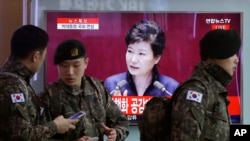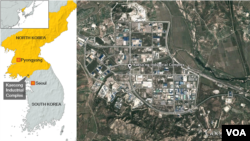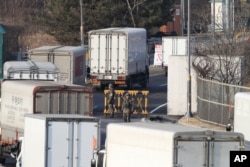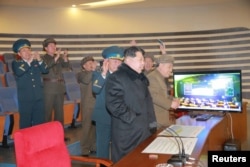South Korean President Park Geun-hye has called for unity and support for her hardline response to North Korea’s recent nuclear test and rocket launch.
During a televised address to the National Assembly in Seoul Tuesday, Park said many South Koreans have become desensitized to the often repeated threat of nuclear war since North Korea first warned in 1994 that it would set the Seoul sky on fire.
“We have lived in fear of North Korea for so long that we have become somewhat insensitive to the security issues. And I think we have overlooked that the North Korean nuclear threat is directed towards us,” Park said.
Closing Kaesong
Park’s address follows the Seoul government’s sudden decision last week to close the jointly-run Kaesong Industrial Complex. She repeated claims that the move was made to halt the North from diverting hundreds of millions of dollars that was intended to pay the wages of the 54,000 workers and instead was used to develop weapons of mass destruction.
The United Nations has banned North Korea from developing nuclear weapons and ballistic missile technology.
After the North’s third nuclear test in 2013, the U.N. imposed sanctions prohibiting bulk transfers of cash that could be linked to Pyongyang’s illicit activities.
The Park administration first made the allegation only days ago that Kaesong funds were being funneled into the North's nuclear program. As recently as January the Seoul government rejected claims that the complex might be in violation of U.N. sanctions regarding bulk transfers of cash to the North.
The South Korean leader said that the Kaesong project, initiated more than a decade ago to build trust, as well as millions of dollars in aid Seoul has provided to the North over the years, has failed to reduce tensions on the Korean peninsula.
On the contrary she said Seoul’s attempts at engagement only emboldened the North Korean leadership to believe that it can provoke and threaten the South and defy the international community without consequence.
“Our good intentions cannot reduce North Korea’s willingness to develop nuclear weapons and it will only help further develop its nuclear capabilities,” she said.
Closing Kaesong will cause economic pain for the North, but will also hurt the 124 South Korean companies that were forced to evacuate their manufacturing plants.
North Korea seized all assets at the complex preventing companies from removing much of their equipment and finished goods. President Park assured the manufactures that the government will reimburse them for most of their losses and assist them to relocate.
Forcing compliance
Seoul’s commitment to a purely punitive approach to compelling Pyongyang to halt it’s nuclear development program, aligns with strong sanctions being imposed by the U.S. and Japan, she said, and with strong international measures being developed in the U.N.
The U.S. Congress recently passed sanctions that would target U.S. assets of individuals or companies that import North Korean goods, technology or training related to weapons of mass destruction.
Japan’s sanctions include prohibiting North Korean ships from entering Japanese ports and a total entry ban on North Korean nationals into Japan.
There are recent indications that China may go along with imposing stronger U.N. sanctions on North Korea. On Friday Chinese Foreign Minister Wang Yi said Beijing will support a U.N. Security Council resolution to make Pyongyang "pay the necessary price."
In an editorial Monday the official China Daily called for sanctions to "truly bite.” And at the ASEAN summit in California, U.S. National Security Advisor Susan Rice said Washington and Beijing are closer to agreeing on “significant new sanctions.”
China is North Korea’s chief economic trading partner and supporter. Beijing has been reluctant to support measures that would cripple its ally and trigger regional instability, such as banning the import of fuel into the North and cutting off all cross border trade.
Bolstering defenses
Citing the evolving North Korean nuclear threat, South Korea's president defended her decision to proceed with formal talks with the United States to deploy the controversial Terminal High-Altitude Area Defense (THAAD) missile defense system.
“We are increasing our Korea/U.S. joint capacity to deter North Korean attacks and also continuing our discussions to improve our joint missile defense posture,” she said.
China and Russia oppose stationing THAAD in Korea because it increases the U.S. military presence in the region and could potentially be used against them.
Chinese Foreign Ministry Spokesman Hong Lei said Monday that Beijing “firmly opposes any countries' attempt to infringe [on] China's strategic security interests.”
Following the North’s nuclear test the United States has rotated more military assets into South Korea. This week the U.S. deployed the nuclear powered submarine USS North Carolina to participate joint exercises with the South Korean Navy. And a Seoul defense ministry official said Washington will soon send four F-22 stealth fighter jets to South Korea.
Park’s decision to support THAAD will likely set back gains made to improve economic and diplomatic ties with Beijing. China is now South Korea’s biggest trading partner. The trade volume between the two Asian neighbors, over $200 billion, is more than double the volume between South Korea and the U.S.
Some analysts expect Beijing to retaliate against Seoul by redirecting trade elsewhere and making it more difficult for Chinese tourists to visit.
On Tuesday Chinese Vice Foreign Minister Zhang Yesui met with his South Korean counterpart Lim Sung-nam in Seoul to discuss the regional security concerns.















